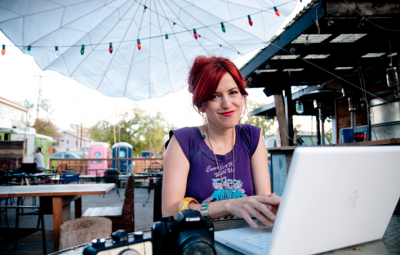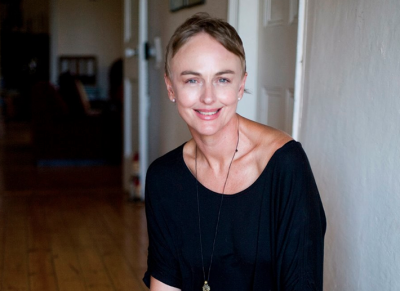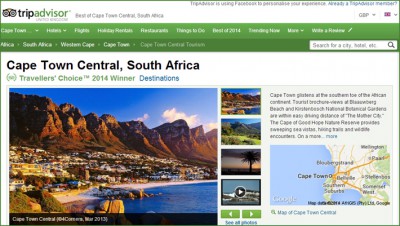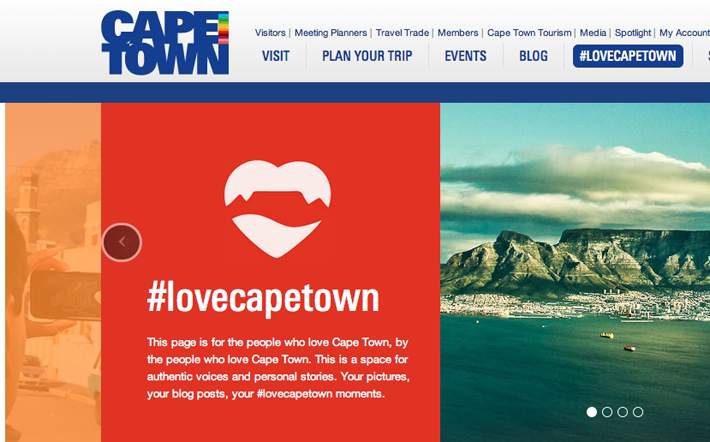In 2009, in the run-up to the World Cup, Cape Town Tourism rolled out its first digital tourism marketing strategy. Five years later, the city is now widely recognised as one of the world’s leading destinations when it comes to making best use of digital and social media.
It’s fair to say that one woman spearheaded the far-sighted revolution. In the early part of the millennium, Mariette du Toit-Hembold had pulled together the city’s fragmented tourism industry under one roof – an achievement many destinations still work toward.
And in 2004, at the aged of 28, she became the first CEO of the newly-formed Cape Town Tourism (CTT). The brand has gone on to collect a trophy cabinet of gongs and accolades for its marketing strategy and innovation, including recognition from the UN World Tourism Organisation and US magazine Travel & Leisure (#SMITTY award for best overall use of social media globally).
After nearly a decade at the helm, she left CTT last autumn to set up her own tourism marketing agency in Cape Town, Desinate, having helped secure three more years of funding from the city. Cape Town Tourism is in a strong position to keep innovating in social and digital.
In a video interview, she summarised how the city went about embracing the new mediums. “We all know that the world has changed fundamentally. Our world is so much more social now and it’s so important to have the customer at the centre of our marketing.”
Its Facebook page has 311k fans, one of the world’s biggest in tourism, helped by a FB game launched in 2012 but with a tremendous attention to constantly posting content. “The secret has been to allow it to grow organically,” she said. “Really investing in time and effort and getting cool people to work on it who really ‘get it’ and to continue to innovate and learn.”
A key strategy has also been to build around the hashtag #lovecapetown. The idea is to encourage Cape Town residents and visitors to create content, so that the potential customer has peer-to-peer information and reviews to rely on – it’s not just Cape Town Tourism pushing a message. The CTT website has a #lovecapetown section, “for the people who love Cape Town, by the people who love Cape Town.” It is a space ‘for authentic voices and personal stories. Your pictures, your blog posts, your #lovecapetown moments,’ it adds.
Says Du Toit-Hembold: “The essence of everything we do is about the stories we generate. We have provided platforms for people to tell those stories – and for us to stand back and not interfere. There’s nothing plastic about it – it’s very real and authentic.” The philosophy has become central in the past five years. Keith Jenkins, CEO of travel blogger consultancy iAmbassadors, worked with CTT on two #lovecapetown projects, bringing overseas bloggers to the city, in 2012 and 2013. “The campaigns contained a big element of crowdsourcing travel tips,” he says. “The iAmbassador bloggers were basically utilised to get Capetonians to talk about their city and share their favourite spots and tips. The result was a barrage of tips via Twitter (Capetonians are very tuned into social media) which were collected and displayed on the Cape Town Tourism blog.
“A point to make is also how well CTT has integrated traditional media channels into the #lovecapetown campaign, mobilising newspapers, radio and TV stations to cover the campaign, interviewing the bloggers and doing all sorts of articles. I loved how traditional and new media were weaved together so seamlessly to give the relatively small campaign a lot more weight.”
Integrating traditional media and continued use of the hashtag are clever and sensible ideas. It’s a long-term strategy after all, with CTT helping accommodate everybody to promote the city together – and not launching a series of one-off, unrelated projects as so many Destination Management Organisations (DMOs) still do.
At the heart of South Africa’s digital tourism industry
World Travel Market will be staging its  inaugural show in Cape Town this weekend (May 2-3), the latest indication that the city and South Africa is the springboard to doing tourism business in Africa.
inaugural show in Cape Town this weekend (May 2-3), the latest indication that the city and South Africa is the springboard to doing tourism business in Africa.
The event will be held at the city’s International Convention Centre, with organisers claiming it is set to be “the leading B2B exhibition for the inbound and outbound African travel markets.”
It also sees the launch of the first WTM Vision conference in South Africa on Friday May 2. WTM also runs Vision conferences at four other destinations globally.
The latest travel trends will be discussed by Euromonitor, while the second Vision session will be from Digital Tourism Think Tank, an initiative which aims to provide thought leadership to the tourism industry in digital marketing best practice. Called ‘Mobile is here to stay – 2014 Goes Mobile’, the session will present global and African case studies of tourism organisations and businesses which have successfully incorporated mobile into their digital marketing.
The session reflects the growing importance of mobile in accessing social and digital content, and reinforces Cape Town’s growing importance within Africa’s tourism industry as a digital visionary.
In September, the city will host the E-Tourism Africa Summit, 2014, following on from last year’s successful event. You can follow the hashtag #eTAS14 for more.
“At South Africa Tourism, we need to lead and teach the trade to embrace all digital and new forms of marketing and communication,” says SAT’s global manager of digital, William Price. “Social media only a part of the mix, and we have to keep on the cusp of the wave and keep the sharing going. “Teaching and leading the trade is no small feat, and we love being able to learn from them and to get them to pull together to build the travel industry in South Africa, making use of all the online super powers that we as destination marketers now have access to.”
South Africa Tourism has partnered with Cape Town Tourism in working together on digital initiatives, including this weekend’s #meetsouthafrica blogging campaign. SAT now has the largest Twitter account in Africa and, adds Price, “we love the results we are getting using Pinterest.”
Interestingly, he highlights Google+ for results that “for us, have been awe inspiring. Google+ has been amazing as it’s been one of the platforms that we couldn’t have anticipated. Growing the G+ community in SA has been phenomenal and the community engagement has been very deep. Comments, shares and likes have given us a lot to work from and we’re learning more and more about the consumer needs via G+ in ways that Facebook and Twitter haven’t been able to offer similar insights on as the G+ environments are so well integrated into how consumers browse our sites and blog.
South Africa Tourism will introduce a TechZone at the INDABA travel trade show, to be held in Durban from May 10-12, and Price says SAT will continue to innovate. “We can’t afford to ignore any new social media networks, and we certainly cannot stop trying to find ways in how we can take our destination to new audiences; we’re having a lot of fun in the social spaces and the audience engagement has taught us so much about what the consumers want and expect, which is dramatically different to the old school mass media work we have been so used to doing.
“Consumers want authentic experiences. Brands and DMOs don’t offer an authentic view of their destinations and so consumers are seeking our peer-to-peer and real recommendations. This is where User Generated Content is critical in destination marketing. This is where we are focusing on and curating great UGC to supplement the marketing communications we do.
“The numbers for us are always important and if we’re making any kind of impact, they reflect immediately in the likes, comments and shares. In totals last year we had massive growth in all our owned, earned and paid for platforms. We’re updating the data now, but here’s what we did last year.”
The #meetsouthafrica campaign

This weekend, 14 bloggers will begin travelling throughout South Africa in the latest campaign to raise awareness of the country’s tourism potential through the ongoing use of hashtags.
The campaign, #meetsouthafrica, is in its second year having had a pilot in 2013. The results were so good that South Africa Tourism (SAT) will run at least three campaigns this year using the hashtag.
The bloggers – 10 international and four domestic – will spend 10 days travelling in the country, with Cape Town a key component of the itinerary. Cape Town Tourism (CTT), like its bigger sister, is a strong believer in bringing in bloggers to create content, then continuing the hashtag presence (#lovecapetown) after the event to sustain the campaign.
William Price, SAT’s global manager of digital, says: “This year we have some new bloggers and less to do – we tried to cover too much in too short a time last year. Getting great value means giving the bloggers enough time to create great content (a key learning from last year).”
A case study of the 2013 #meetsouthafrica campaign is revealing. There were 6,535 mentions of #meetsouthafrica during the campaign, and overall a total of 9,970 tweets and 1,059 Instagram photos using the same hashtag.
Cape Town was the most hashtagged place, with Soweto second. Overall, SAT estimates there were 161m opportunities for social media users to engage with South Africa, the marketing equivalent of $40m, according to Price. “It’s been the single biggest travel blogging event in Africa – and the results for us has been more than 31 times the investment in terms of PR value and ROI (return on investment).”
Most interestingly, the bloggers contributed just 36% of the #meetsouthafrica conversation – the other two-thirds came from the public. So the bloggers provide the things to talk about, and the public pick up on that and expand. It’s why SAT and CTT have kept their hashtags going, as do other destinations like New York City.
And it’s why the exercise is being repeated, to refresh and add to the amount of content. Says Price: “This year we hope to get more than 220 million opportunities to see, and far more engagement via Twitter, Facebook and Instagram while our bloggers traverse the country. “Last year’s massive numbers are going to be tough to beat, but we aim to get more conversation, more inspirational content and better integration of the blogger’s content across our marketing channels to showcase our Heritage and Culture, Adventure and Luxury (this years’ themes).
“Bloggers are a key area of our social marketing strategy as they command online influence. They aren’t however the only weapon in our arsenal. We partner with Expedia, TripAdvisor, WAYN.com – and are going to do far more this year with Facebook and Instagram to make sure we can create opportunities to share inspiration and information in a highly impactful way to get more leisure and business travelers to consider South Africa as a destination.
“We will be making sure we get the bloggers in the picture too – this year we have a film crew on the trip capturing the bloggers doing their thing as we build towards a more comprehensive campaign this year.”
The blogger’s perspective
 Based between Cape Town and the winelands, Dawn Jorgensen sold her incoming tour operation a few years back and is now a full-time blogger and travel writer as The Incidental Tourist. We asked for her views on how Cape Town uses social media in travel marketing…
Based between Cape Town and the winelands, Dawn Jorgensen sold her incoming tour operation a few years back and is now a full-time blogger and travel writer as The Incidental Tourist. We asked for her views on how Cape Town uses social media in travel marketing…
The blogger campaign #meetsouthafrica is about to start its second round. How important is such exposure to Cape Town and the other SA destinations involved?
#meetsouthafrica has proved to be invaluable in the marketing of South Africa and the various destinations it offers. Cape Town will only be visited by one of the groups this time, as the focus will be spread across the country with the bloggers divided into Heritage, Luxury and Adventure groups for their time here. Although I know that the #loveCapeTown sentiment will prevail and I have sneaky suspicion that many of the international bloggers will extend their stay to visit Cape Town.
South Africa, and Cape Town in particular, seem to have understood and implemented social media campaigns better than most destinations. Agree? And if so, why is that?
I certainly do agree and its been wonderful to be a part of it and get to know some of the key role players that led Cape Town to win the Travel and Leisure Smitty Award for best overall use of social media. As well as a Cannes Lions Gold Award for their advertising agency that worked on the ‘Send your Facebook profile to Cape Town’ campaign. Hashtags such as #meetsouthafrica and #lovecapetown also offer everybody ownership of our city and country, they invite involvement and has been warmly embraced.
Has there been as much emphasis from South Africa Tourism/Cape Town Tourism in working with locally-based bloggers as there has with international writers/bloggers? Is it a fair/good balance?
Both SAT and CTT have done much to gain the support of local bloggers with their respective campaigns. They acknowledge our worth and potential influence. Specifically Cape Town Tourism which has encouraged bloggers to contribute to the CTT blog, use the hashtag and in turn shared the content on their official accounts. My favourite is Love Cape Town – a page for people who love Cape Town by people who love Cape Town. It’s a thrill to see your contributions shared here. That said, it is as important to build relationships with local bloggers as it is with international ones. Also to bridge the divide between the two. This is all so new to us and I believe that they are doing wonders and mostly getting it just right.
Following on from that, how do you rate SA travel bloggers as a whole? Co-operative, progressive, commercially savvy? A bunch of disconnected writers doing it for themselves? Or somewhere in between?
I’d say somewhere in between. There is much goodwill and travel bloggers seem to be the most ready to collaborate and form a community. My background is travel and tourism, its what I know and do, which means that my blog is a natural extension of me. Although many lifestyle and food bloggers are now adding an element of travel to their blogs. The freelance writing world is rather cut-throat, as many creative industries can be. Generally I think we are savvy, fun and rather progressive. Mostly willing to learn too, as we don’t always get it right. Sticking my neck out, I’d rather be a travel blogger than any other.
What’s your opinion on how other Cape Town tourism brands, such as tour operators/hoteliers, use social media? Beginners, OK or brilliant?
Mostly, bar a few, are beginners. It really is an area that needs developing, but as yet I’m not sure they are seeing the true value and simply aren’t taking the time required.
Is it the public or private sector driving digital and social marketing in travel in SA. And how far/well are they doing together or individually? Long way to go?
I’d say the private sector is driving digital and social media in this city with some successful cross over projects leading the way.
Interview by Steve Keenan
Dawn is also this week setting up the first Travelmassive in Cape Town.
In an interview to mark the event, she lists her favourite travel blogs to visit as Cape Town Magazine, Cape Town Tourism blog, Future Cape Town and The Getaway travel blog.
You can also find Dawn on Twitter, Facebook, Pinterest, Instagram and YouTube.
Cape Town and the TripAdvisor effect
 Cape Town and social review site TripAdvisor have something of a love-in.
Cape Town and social review site TripAdvisor have something of a love-in.
The city is again riding high in the travel review site’s annual Traveller’s Choice Awards, making the global top 20 again as a destination in 2014 and placed second in the ranking for Africa after Marrakech. Cape Town is no stranger to the awards and has appeared in the top 25 every year since the launch of the awards in 2010. In 2011, the city took the top spot worldwide. Announcing its 2011 victory, TripAdvisor’s Emma O’Boyle cited the city’s “beautiful scenery, great wine and gorgeous weather”.
Cape Town’s success as a destination is in no small part down to its highly rated hotels, with the Cape Grace and 2Inn1 Kensington – two hotels that could hardly be more different – doing particularly well in TripAdvisor’s Traveller’s Choice awards at the hotel level.
Cape Grace has received a Traveller’s Choice Award this year in the luxury category. Some 88% of reviewers of this hotel with its enviable location on the Victoria & Albert Waterfront have rated this property in the top category of Excellent. In the 2013 Awards, Cape Grace was voted number 2 in the world. General manager Sandy Pollard said of the award, “We take great pride in this recognition bestowed on us by our guests. We are delighted to be considered amongst the world’s finest and this award acknowledges each and every staff member’s contribution and effort to raise the bar and provide the ultimate luxury hotel experience for our guests.”
TripAdvisor users have ranked 2Inn1 Kensington as their choice in both the small and romantic hotel categories. This nine-room guesthouse has a grand total of zero poor and Terrible reviews on TripAdvisor from around 500 posted by reviewers who call it a “home away from home”, “outstanding” and with a “stratospheric service level”.
TripAdvisor’s James Kay says the rankings “are based on the more than 100 million reviews and opinions from travellers on TripAdvisor, including traveller ratings for specific categories”. The review site uses an algorithm to crunch reviews, opinions “as well as the quantity and recency of content written on TripAdvisor”.
Why are these awards important? The TripAdvisor awards generate large amounts of traditional and social media coverage. Higher TripAdvisor rankings – and there is clearly some correlation between this and winning an awards – have regularly been shown to lead to greater bookings, such as in this research from Micros.
Cape Town has also come second among international cities in TripAdvisor’s Tripindex which ranks destinations according to the average prices for room service.
CEO of Cape Town Tourism, Enver Duminy, remarked; “It is important to be consistent with our pricing and to sustain the perception of offering value-for-money products and services to locals and travellers alike, even when our own currency favours the pockets of many of our visitors. These recent “best value” accolades substantiate our message that Cape Town is affordable for travellers both in terms of accommodation and in many of the added extras.”
Breakout: Cape Town on the up
A recent survey for Cape Town Tourism showed that the most important sources of information for visitors were word of mouth (40%) and the internet (31%). Traditional media came in at just 16%. Clearly sites like TripAdvisor (main story) are hugely important in the trip planning process.
The city’s hotels are also enjoying better results. Tourist arrivals in the city are up while occupancy in Cape Town’s hotels stood at 63% in 2013, up 1.1% on the previous year. A welcome sign for hoteliers is that revenue per available room (RevPAR) has been growing strongly over the recent southern winter. In November 2013, January and February 2014, RevPAR was up by more than 20% on the previous year.
Infographic: Social Cape Town in Numbers


